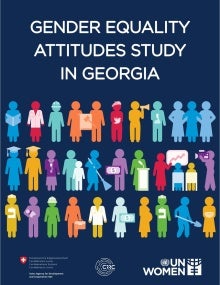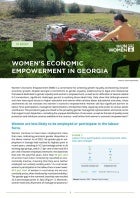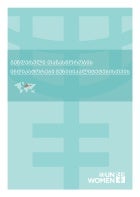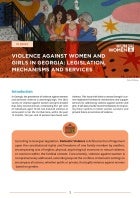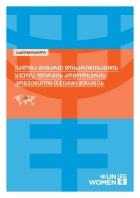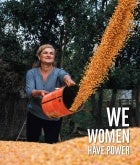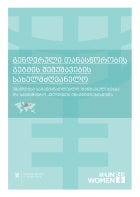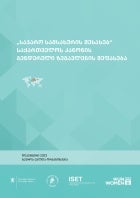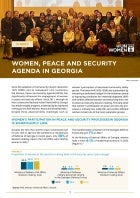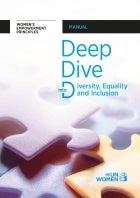1 - 20 of 74 Results
Pagination
Date:
This report sheds light on a hidden dimension of the economy - unpaid domestic and care work - and helps make women’s contributions more visible by assigning a monetary value to this labor.
Date:
This publication vividly illustrates how businesses strive to increase women’s access to finance and healthcare services, integrate women into technology and other high-paying industries, break gender stereotypes, and turn aspirations into reality.
Date:
The 2024 Gender Equality Attitudes Study (GEAS) in Georgia was commissioned by UN Women within the framework of the “Women’s Increased Leadership for Democracy in Georgia” (WILD) project generously supported by the Swiss Agency for Development and Cooperation (SDC). The study was implemented by CRRC-Georgia.
Date:
To raise awareness of women's political participation and their historical contributions to Georgia’s political, social, economic, and cultural life, UN Women, in partnership with the Korneli Kekelidze National Center of Manuscripts, has published a book on the legal status and rights of Georgian women from the 12th to 18th centuries.
Date:
The purpose of the Guide on Gender-responsive Employment Policies in Public Service is to promote and strengthen integration of gender equality principles in the employment systems and processes governing the functioning of the public service in Georgia.
Date:
This issue brief describes the facts and figures related to women’s economic empowerment in Georgia.
Date:
The document presents minimum and extended lists of gender equality indicators, that can be used by the municipalities to develop, monitor and evaluate gender equality action plans.
Date:
This issue brief describes the facts and figures related to women in decision-making in Georgia. By visualizing data from Country Gender Equality profile (2023) and other relevant studies, the publication shows that women are under-represented in decision-making positions in the parliament, executive government, civil service, and local government.
Date:
The policy document aims to offer state institutions and stakeholders a vision for the formalization of domestic work in Georgia.
Date:
This issue brief describes the situation related to Women, Peace and Security in Georgia. Building on the Country Gender Equality Profile (2023) the publication describes Violence against Women related legislation, mechanisms and services in Georgia.
Date:
The handbook aims to foster a better understanding of the Convention on the Elimination of All Forms of Discrimination against Women (CEDAW), its Optional Protocol and the related reporting, implementation, and monitoring processes. The handbook provides comprehensive overview of the Convention and its accompanying documents, including the analysis of the scope, objectives, and women’s rights guaranteed in the CEDAW.
Date:
The study was conducted in 2023 and assessed capacities of CSOs working on gender equality and women’s empowerment in Georgia, identified their main strengths and weaknesses and developed evidence-based recommendations on designing tailored capacity development support initiatives for CSOs in order to facilitate their engagement in decision making on gender equality and women’s empowerment in Georgia.
Date:
Since 2013, the UN Women Country Office in Georgia has been working on strengthening the capabilities and skills of women living in rural areas with the support of social mobilization. Community training sessions on this topic help them to continually participate in how local priorities and budgeting are determined.
Date:
The study on Views and Attitudes of IDP Women on Conflict Transformation, Reconciliation and Peacebuilding is the first of its kind in the field and uses quantitative and qualitative methods to examine the perspectives of IDP women, including young. The Study further offers alternate solutions and recommendations for fostering conflict transformation, peaceful conflict resolution, and confidence-building measures in Georgia.
Date:
The manual includes specific guidelines, recommendations and useful resources for higher education institutions and research organizations for developing, implementing and monitoring gender equality plans.
Date:
Country Gender Equality Profile (CGEP) of Georgia serves as a comprehensive national-level analysis of the status of gender equality in the country. Based on quantitative and qualitative analysis of recent data, the CGEP provides strategic analysis of progress, trends, challenges and priorities around gender equality in Georgia and serves as a blueprint for targeted interventions, policy reforms and institutional improvements to advance gender equality and women’s rights in the country.
Date:
The findings of the Gender Impact Assessment (GIA) of the Law of Georgia on Public Service identify the causes and consequences and analyze the main barriers to women’s leadership in public service, as well as offer a set of legislative and policy recommendations on promoting women’s leadership and mainstreaming gender in public service.
Date:
The study was conducted by UN Women in partnership with GEOSTAT within the framework of the “Ending Violence against Women and Girls in Georgia” project funded by the European Union and UN Women’s "Making Every Woman and Girl Count" programme in Europe and Central Asia (Women Count).
Date:
This issue brief describes the situation related to Women, Peace and Security in Georgia. By visualizing data from Country Gender Equality profile (2023) and other relevant studies, the publication presents share of women in security sector as well as in peace processes and challenges faced by internally displaced and conflict-affected women.
Date:
This manual primarily aims to provide human resources and DEI professionals in WEPs signatory
Companies - large and small-with guidance to design, implement and track progress against
their workplace DEI policies and procedures and cultivate corporate DEI cultures.
